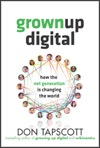Book: Grown Up Digital
Don Tapscott’s “Grown Up Digital: How the Net Generation Is Changing Your World” is such a book. It explains how digital technology has affected the children of the baby boomers, a group he calls the Net Generation, and how these kids are poised to transform society in a fundamental way.
What’s more, Tapscott (who also co-authored Wikinomics) drew for his book on a $4 million research project that undertook more than 11,000 interviews with Net Geners, along with scientific studies, input from academics and leaders in business, education and government.
Since I am not a professional reviewer, book reading is an extracurricular activity that takes me somewhat more time. I am only a third done, and on the whole the balance is positive. So this is an in-between observation — provoked by a few other reviews that I don’t want to withhold you from — yet I am likely to come back to the book once I am done with it.
Although the book’s descriptive pieces tend to be a bit non-surprising for an astute observer, the analysis is first class. Tapscott has a knack for condensing his insights in strong synthesis that is just excellent.
Here is a short excerpt:
THE EIGHT NET GENERATION NORMS
If Wonder bread builds strong bodies in 12 ways, this generation is different from its parents in 8 ways. We call these 8 differentiating characteristics the Net Generation Norms. Each norm is a cluster of attitudes and behaviors that define the generation. These norms are central to understanding how this generation is changing work, markets, learning, the family, and society. You’ll read about them throughout the book.
- They want freedom in everything they do, from freedom of choice to freedom of expression. […]
- They love to customize, personalize. […]
- They are the new scrutinizers. […]
- They look for corporate integrity and openness when deciding what to buy and where to work. […]
- The Net Gen wants entertainment and play in their work, education, and social life. […]
- They are the collaboration and relationship generation. […]
- The Net Gen has a need for speed — and not just in video games. […]
- They are the innovators.
A recent Economist review provides a very good summary of the book and underlines the two things that Tapscott worries about:
“One is the inadequacy of the education system in many countries; while two-thirds of Net Geners will be the smartest generation ever, the other third is failing to achieve its potential. Here the fault is the education, not the internet, which needs to be given a much bigger role in classrooms (real and virtual). The second is the net generation’s lack of any regard for personal privacy, which Mr Tapscott says is a ‘serious mistake, and most of them don’t realise it.'”
Tapscott himself meanwhile has done his own bit to promote the book, not in the least through his eight (!) part article series for Business Week:
- Net Geners come of age
A new generation of Americans that has grown up digital are poised to make history on Election Day, if the polls are right.
- How digital technology has changed the brain
By their 20s, young people will have spent more than 30,000 hours on the Internet and playing video games. That’s not such a bad thing.
- Net Gen transforms marketing
The author of Grown Up Digital explains how Web savvy among the Net Generation (the boomers’ kids) will change how goods are bought and sold.
- How to hire the Net Generation
Hiring the under-30, digitally savvy young workers who will be the next generation of managers requires adapting recruitment strategies to fit the demographic.
- How to teach and manage ‘Generation Net’
The sage-on-stage model no longer works. To reach the Internet Generation’s members, engage them in conversation and let them work in groups.
- Supervising Net Gen
Forget top-down management. To harness the potential of young employees, you’ll need to collaborate and give them lots of feedback.
- Focus on the Net Gen family
The kids who grew up digital are closer to their parents than the previous generation. And they’ll bring new attitudes into the workplace.
- The Net Generation takes the lead
Enabled by the Web and digital technology, the Net Generation is transforming media, politics, and culture. Will older generations stand in the way?





[…] additional two-pagers (of eight projected) are linked at “Putting People First“– including one on “How Digital Technology Has Changed the […]